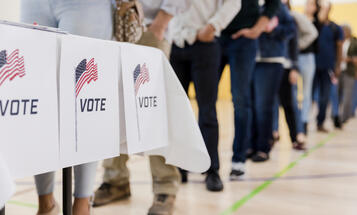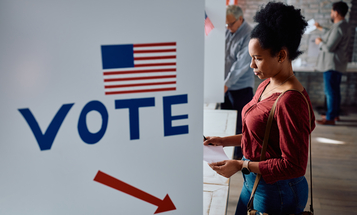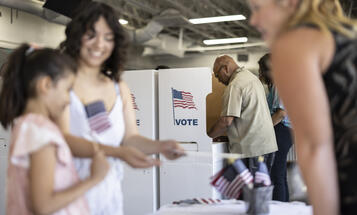
Voter Registration Day: How Far We Have Left to Go
Where states are rolling back voting rights and why automatic voter registration could be the answer.
There are over 55 million people eligible to vote who remain unregistered in the United States right now. Those people represent approximately one-fifth of the total voting-eligible population, meaning that even if every single person in the country who is currently registered goes out and votes in the upcoming presidential election, America still wouldn't crack the top five countries in overall turnout among similarly advanced, democratic nations. That is a glaring problem which can only be rectified by simplifying voter registration procedures and removing artificial barriers to the right to vote.
People don’t have to jump through hoops to exercise their freedom of speech or freedom of religion – they shouldn’t have to to practice their right to vote either.
Automatic voter registration (AVR) would be the simplest solution for getting all eligible citizens on the voter rolls by making registration an “opt-out” process rather than an “opt-in’ process. AVR has the potential to add huge numbers of eligible, unregistered voters to the rolls. The right to vote is a constitutional guarantee and the bedrock of American democracy. People don’t generally have to register or jump through hoops to exercise their freedom of speech or freedom of religion – they shouldn’t have to jump through hoops to practice their right to vote either.
Unfortunately, many states have elected to make voting harder rather than easier over the last few years. In North Carolina, for example, government offices such as the Department of Motor Vehicles (DMV) and public assistance offices are failing to comply with the National Voter Registration Act (NVRA), which stipulates that DMVs and public assistance offices must provide voter registration services to individuals seeking services through those agencies. When that failure was pointed out, the state board of elections did nothing. As a result, Demos is now fighting to get public agency registration rights restored for North Carolinians.
Ohio has also struggled to comply with the NVRA. Its election officials have been purging tens of thousands of eligible voters from Ohio’s voter registration rolls, for no other reason than the fact that the voters had not voted in the last few elections. The purges disproportionately affected Black and Latino neighborhoods. Arbitrary and discriminatory voter suppression is one of the greatest threats to our democracy, which is why Demos attorneys have challenged Ohio’s purge practices. Just last week, a federal appellate court agreed with our arguments and ruled that Ohio’s purge procedures violate the NVRA and must be reformed
Both North Carolina and Ohio have egregiously failed their citizens when it comes to voting and voter registration, but they are hardly alone. Fourteen states have new voting restrictions on the books to make it harder to vote in this election. Courtroom battles over voting rights are requiring enormous expenditures of resources from civil rights groups, especially in the wake of the Supreme Court ruling in 2013 which struck down a key provision of the Voting Rights Act. If this country is ever going to have a truly inclusive democracy – one which works to ensure that all eligible persons can register and vote – we must do more to ensure that states take affirmative steps to register persons who are eligible to vote and that they also end practices that arbitrarily remove eligible persons from the voting rolls.



